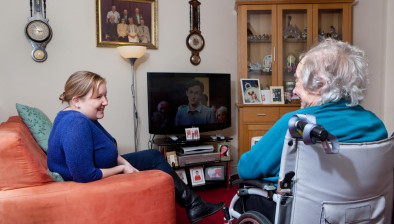Care home vaccinations to start today but visiting arrangements remain unchanged

Health secretary Jeane Freeman
Residents of homes for older people in Scotland will begin to receive the Pfizer vaccine against COVID-19 from today.
After more than 5,000 key NHS workers and vaccinators received the vaccine in the first few days of the programme, it is now being extended to include care home staff and residents.
The move has been made possible following confirmation that the Pfizer vaccine can be ‘packed down’ into smaller pack sizes. The vaccine, is received in packs of 195 five dose vials which must be diluted before use, but these can also be transported in an unfrozen state for up to 12 hours, and can be stored undiluted for up to five days.
The Medicines and Healthcare products Regulatory Agency has given the go-ahead for health boards to do this, making it possible to take the vaccine direct to care home residents or to vaccination centres nearby, with minimal wastage.
Cabinet secretary for health, Jeane Freeman, said that care home residents would be prioritised for receipt of the vaccine from current supplies but warned that pace of the vaccine delivery programme remains dependent on the supply of doses.
She said: “This is another important moment in our journey through the coronavirus pandemic and I am delighted that we have received the authorisation we need to enable us to vaccinate the most vulnerable people in our care homes.
“Officials in the government and our health boards, along with Pfizer, and the MHRA, have worked really hard to allow this to happen and it is another step on the road to our collective recovery and a return to a more normal way of life.
“We are providing the vaccine to people in care homes according to the order of priority set out by the Joint Committee on Vaccination and Immunisation (JCVI) and we will work through that order of priority as quickly as vaccine supply allows.
“We are hopeful that subject to further stringent approvals, other vaccines may meet MHRA approval for supply – for example, AstraZeneca and Moderna – enabling more vaccinations to take place at a faster rate.”
“In the meantime it remains vital that we all stick to the published restrictions and follow public advice to keep suppressing the virus to as low a level as possible.”
Meanwhile, it has been confirmed that visiting arrangements for hospitals and care homes in Scotland will remain in place over the Christmas and New Year period.
For the general public, there will be UK-wide easing of restrictions on travel and gathering between December 23–27.
However, in a joint-letter to NHS boards, the interim chief medical officer, chief nursing officer and national clinical director clarified this would not apply to hospitals over the Christmas period, given the increased vulnerability of hospital patients compared to the general population.
Christmas and New Year guidance has also been published for the adult care home sector, recommending that indoor visiting should continue to be supported where it is safe to do so, as well as setting out specific safeguards that care homes can put in place to safely support festive activities.
Ms Freeman said: “While most people will see a limited relaxation of existing restrictions over the holiday period, hospital and care home visiting guidance will remain in place to protect patients and residents.
“However, we are encouraging Boards and care homes to continue to apply this guidance with flexibility and compassion, given how important the Christmas and New Year period is for many families, to ensure no-one is unnecessarily isolated over the Christmas period. Essential visits should also continue regardless of local restrictions, as they have throughout the pandemic.
“In care homes this will be facilitated by testing of designated visitors, which will be rolled out to all care homes from Monday onwards. Testing is not required for visiting but it does add an additional layer of protection, and we will make PCR testing available for any care homes unable to make use of lateral flow tests before Christmas.








